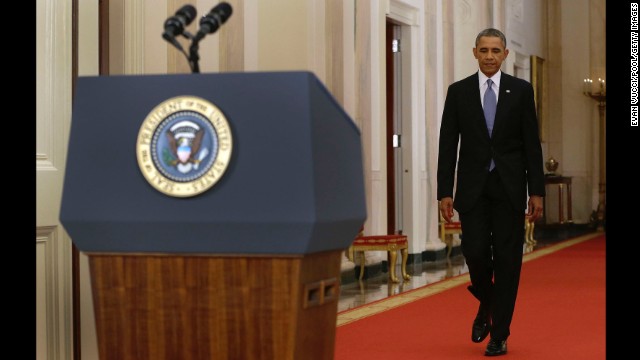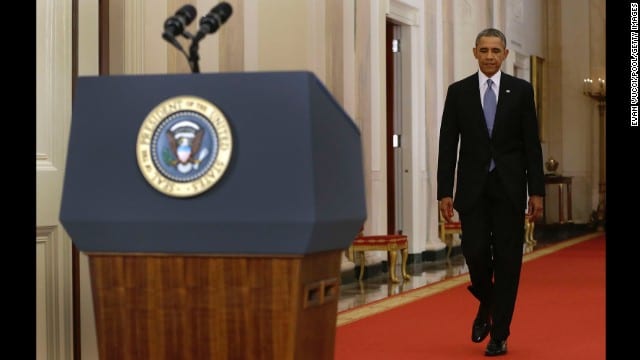
When President Barack Obama delivered his September 10, 2013 speech on Syria, his policy aim was articulated clearly:
after careful deliberation, I determined that it is in the national security interests of the United States to respond to the Assad regime’s use of chemical weapons through a targeted military strike.
This speech had a more immediate target however: the American public’s reluctance to support a limited and narrow strike on Syria. Polls showed substantial public opposition despite the horrific images of chemical weapon attack victims in Ghouta just weeks before. Support for a Syria attack was lower than it was with previous, similarly “limited” actions in Grenada (1983), Kosovo (1999), Haiti (1994) and Libya (2011).
Facing the apparent unpopularity of the proposed military action, the President decided to seek Congressional authorization rather than taking unilateral moves against Syrian military capacity.
His speech was meant to turn the tide in support of Congress’s approval. While there is survey evidence that the speech persuaded some of those who watched it, it still only led to an aggregate split in public opinion. Striking Syria simply did not resonate with a majority of Americans even though an estimated 32 million viewers tuned in and many more read and heard his arguments.
We know that the President’s power to persuade the public on foreign affairs is strongest when there is an elite consensus back his policies. While there were voices of dissent in the House, the Senate Foreign Relations Committee ultimately endorsed what the President sought: a resolution authorizing military action against Syrian President Bashar al-Assad’s government. This signified a growing elite consensus.
TV news media were largely supportive of the President. As Robert Entman has proposed in the “cascading activation” model, lower-tier elites, and news media, echo the policy frames of the upper echelons in the executive branch. After Obama first proposed a strike was necessary in late August, cable news channels were far more likely to feature pro-intervention messages than views opposed, according to a content analysis conducted by Pew Research. This is evidence of news media echoing officialdom.
Yet, House opposition to the President’s proposed course of action was considerable. Factions in both parties, both liberal Democrats and libertarian Republicans, voiced objections to the attack. It was not certain that the resolution would have passed through the House. At the time of the speech, CNN estimated 179 “no” votes to 25 “yes” votes. 223 were yet undecided. This can’t be chalked up to deeper partisan polarization. Members of Congress reported hearing universal opposition from their constituents. The public’s complaints overwhelmed the President’s position and undermined the dominant theme of news media coverage.
A Russia-proposed chemical weapons deal ultimately postponed consideration of a Congressional resolution, thereby preventing a test of whether the President was going to win on this. Still, we witnessed a unique case of public opinion opposition to, and mobilization against, a President’s proposed foreign military action.
Perhaps it can be attributed to something deeper in American political culture. As Charles M. Blow suggested in The New York Times, “America may have lost its stomach for military intervention.” After war of more than a decade in Iraq and Afghanistan, Americans may just be tired of getting into new skirmishes that could easily lead to deeper commitments. Just five years into the Iraq war, US news media were barely covering it and Americans tired of hearing about it. There is scant mention and public discussion of the war in Afghanistan today.
The idea of “war fatigue” is not a novel one. It was widely believed that after the Vietnam War a syndrome set in: Americans were thought to be more likely to oppose to new wars out of a risk aversion resulting from the costly, bloody and protracted conflict in Vietnam. Marvin Kalb argued the current form of this syndrome was apparent just from President Obama’s nominations of John Kerry and Chuck Hagel as secretaries of state and defense, respectively.
Curious about whether American views on the previous wars impacted their positions on the proposed Syria strike, I ran a study to measure what impacted American opinion. I tried to figure out how important various factors were: demographics, support for the president, prior positions on the Iraq war and how attentive they were to the President’s September 10th speech — to see how the President’s persuasive powers stacked up against war fatigue.
I asked 265 respondents on two separate days, September 9 and September 13, 2013, whether or not they support a US military intervention in Syria. I asked different samples, one before the speech and one a few days after. I found the following (shown in an OLS regression model).
| Model |
Standardized Coefficients |
t |
Sig. |
|
|
Beta |
||||
| (Constant) |
1.469 |
.143 |
||
| AGE |
.120* |
2.142 |
.033 |
|
| INCOME |
.079 |
1.350 |
.178 |
|
| EDUCATION |
-.086 |
-1.492 |
.137 |
|
| RACE |
.017 |
.302 |
.763 |
|
| GENDER (Female) |
-.180*** |
-3.213 |
.001 |
|
| PID |
-.028 |
-.369 |
.713 |
|
| Sharing President Barack Obama’s views in general |
.331*** |
4.456 |
.000 |
|
| Became more or less supportive of the US IRAQ war? |
.293*** |
5.211 |
.000 |
|
| Watched or saw reports of President Obama’s speech on Syria? |
.100 |
1.794 |
.074 |
|
(Adjusted R2 = .213)
Of traditional demographics, age and gender were significant predictors. Older individuals and males were more likely to back a strike. It is worth noting that party identification was not an important factor — when controlling for these other factors — despite being a usual factor in evaluating presidential policy proposals. While it could be due to the break down in partisan lines on this issue, at least until the Russia deal, it’s likely not a factor because the most powerful variable — generally agreement with Obama on other issues — captures partisan differences. [Without partisan ID, the findings and model fit don’t change much].
Despite being an “anti-war” candidate when he was first elected, Obama enjoys the unwavering backing of loyal supporters. Being inclined to generally agree with him on issues was an expected, powerful predictor of being with him on Syria. It was the strongest factor in the model.
As for non-Obamaniac tendencies, war weariness seems to matter. Becoming less supportive of the war on Iraq over time (my gauge of war fatigue) correlates with being less likely to back the strike. The result is the same, though a bit weaker, if I replace Iraq with Afghanistan, also. Rather than seeing Syria as a new and distinct issue, this finding suggests people interpret it within the context of prolonged and increasingly unpopular military commitments in the region.
Prior views on Iraq also matter more than does partisanship. I ran the model with partisan ID, but dropped the tendency to agree with Obama. Declining support for the Iraq war over time was twice as powerful a predictor than was partisanship.
Back to the model above, we can see that changing support for or against the war on Iraq over time was a more powerful predictor than being attentive to the President’s speech. His ability to persuade the public through strategic political communication was a less potent a force than the unpopularity of the wars of the past decade. Even if the proposed strike was being sold as limited and narrow, it did little to relieve the public’s fear of deja vu.

